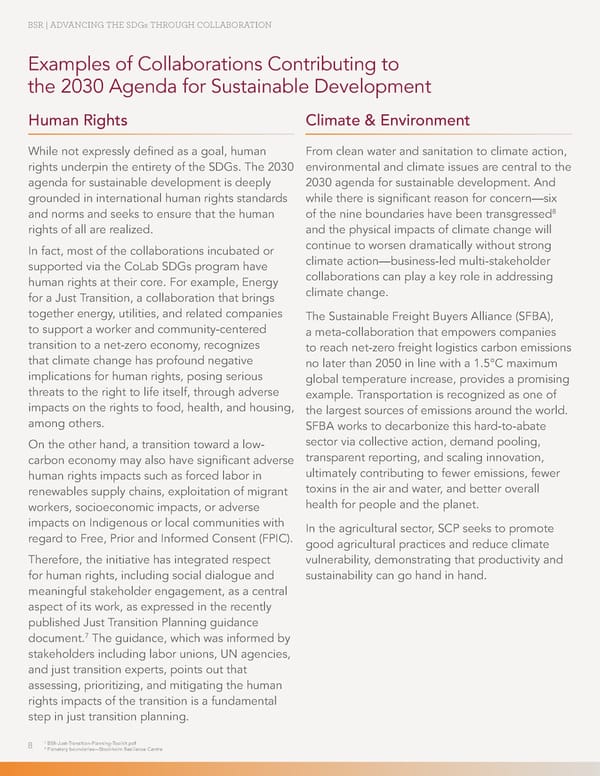BSR | ADVANCING THE SDGs THROUGH COLLABORATION Examples of Collaborations Contributing to the 2030 Agenda for Sustainable Development Human Rights Climate & Environment While not expressly de昀椀ned as a goal, human From clean water and sanitation to climate action, rights underpin the entirety of the SDGs. The 2030 environmental and climate issues are central to the agenda for sustainable development is deeply 2030 agenda for sustainable development. And grounded in international human rights standards while there is signi昀椀cant reason for concern—six 8 and norms and seeks to ensure that the human of the nine boundaries have been transgressed rights of all are realized. and the physical impacts of climate change will In fact, most of the collaborations incubated or continue to worsen dramatically without strong supported via the CoLab SDGs program have climate action—business-led multi-stakeholder human rights at their core. For example, Energy collaborations can play a key role in addressing for a Just Transition, a collaboration that brings climate change. together energy, utilities, and related companies The Sustainable Freight Buyers Alliance (SFBA), to support a worker and community-centered a meta-collaboration that empowers companies transition to a net-zero economy, recognizes to reach net-zero freight logistics carbon emissions that climate change has profound negative no later than 2050 in line with a 1.5°C maximum implications for human rights, posing serious global temperature increase, provides a promising threats to the right to life itself, through adverse example. Transportation is recognized as one of impacts on the rights to food, health, and housing, the largest sources of emissions around the world. among others. SFBA works to decarbonize this hard-to-abate On the other hand, a transition toward a low- sector via collective action, demand pooling, carbon economy may also have signi昀椀cant adverse transparent reporting, and scaling innovation, human rights impacts such as forced labor in ultimately contributing to fewer emissions, fewer renewables supply chains, exploitation of migrant toxins in the air and water, and better overall workers, socioeconomic impacts, or adverse health for people and the planet. impacts on Indigenous or local communities with In the agricultural sector, SCP seeks to promote regard to Free, Prior and Informed Consent (FPIC). good agricultural practices and reduce climate Therefore, the initiative has integrated respect vulnerability, demonstrating that productivity and for human rights, including social dialogue and sustainability can go hand in hand. meaningful stakeholder engagement, as a central aspect of its work, as expressed in the recently published Just Transition Planning guidance 7 document. The guidance, which was informed by stakeholders including labor unions, UN agencies, and just transition experts, points out that assessing, prioritizing, and mitigating the human rights impacts of the transition is a fundamental step in just transition planning. 7 BSR-Just-Transition-Planning-Toolkit.pdf 8 8 Planetary boundaries—Stockholm Resilience Centre
 Advancing the SDGs through Collaboration Page 7 Page 9
Advancing the SDGs through Collaboration Page 7 Page 9